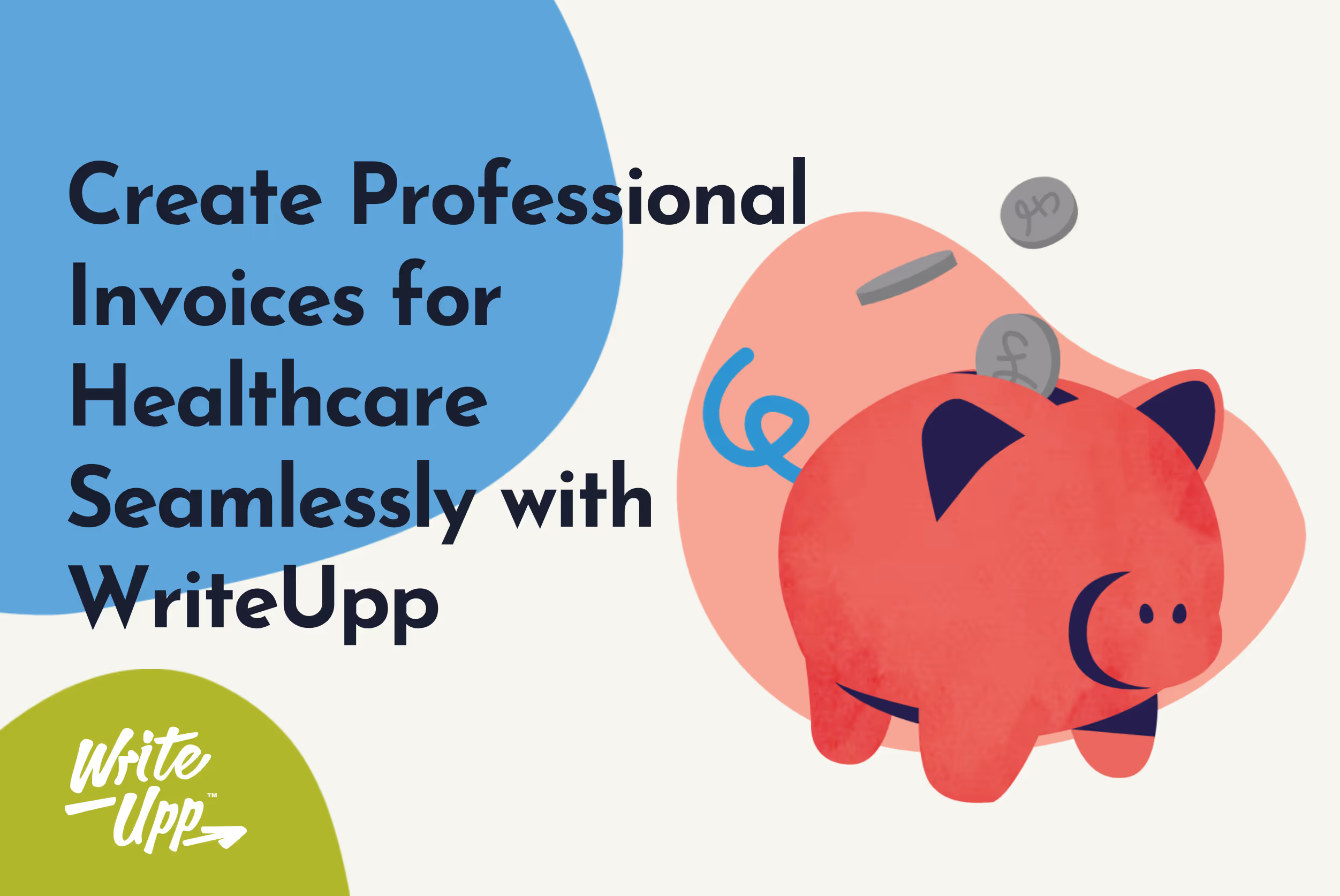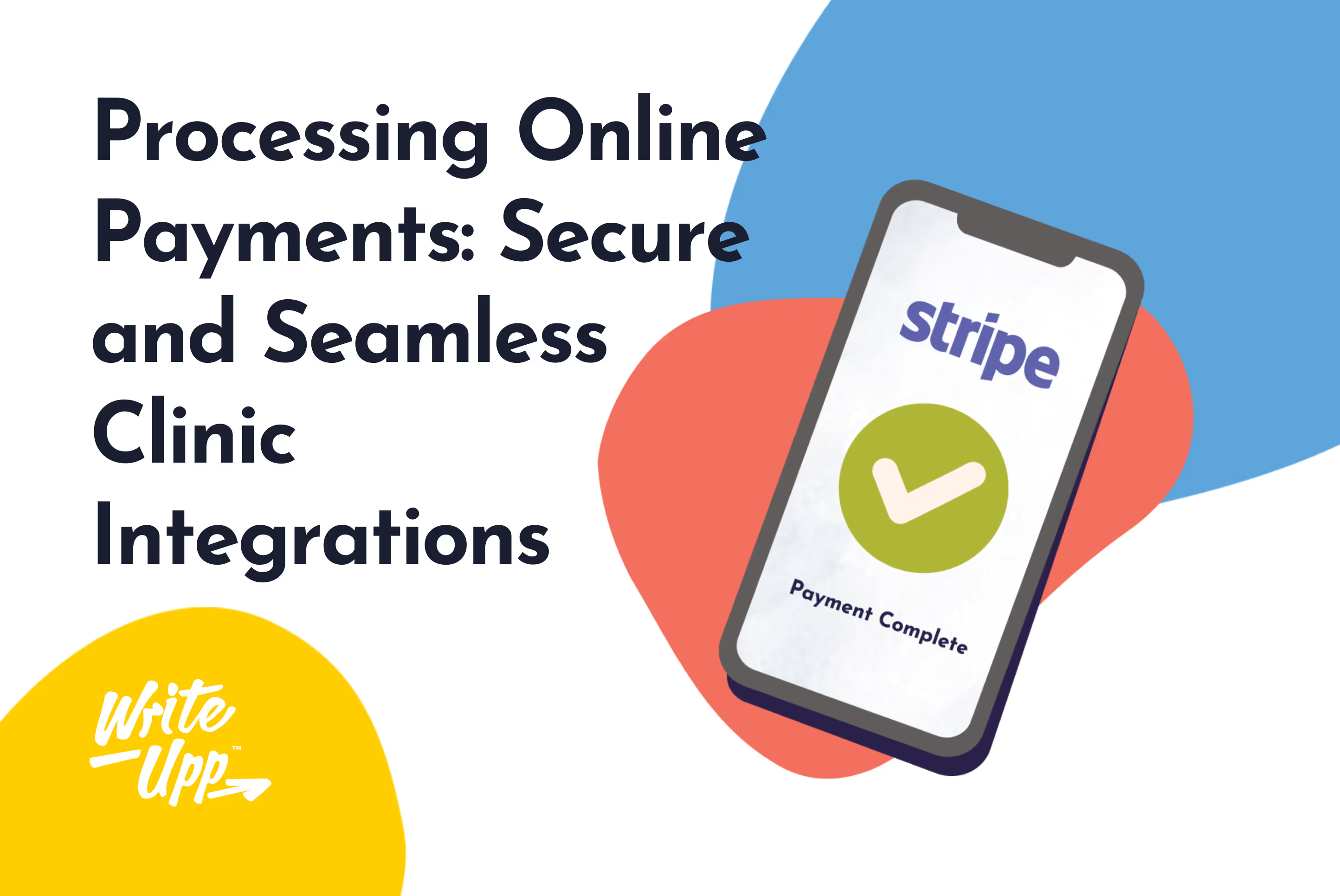Private practice can be a fulfilling and lucrative career path for many professionals, but it also comes with its fair share of financial responsibilities. As a private practice owner, it is crucial to have a solid understanding of your business finances to ensure its success.
Managing finances in private practice requires careful attention to detail and a strong understanding of basic financial principles. We recently spoke to Gavin Simpson, CEO and Founder of financial solutions business FourFourFive, and Founder of Cloud Finance, a remote accounting support service.
Gavin gives us advice on the financial processes essential to your practice running smoothly, from the basics and common stressors to deciding whether to outsource accounts.
You can listen to the whole conversation on The Healthy Practice podcast from WriteUpp:
https://pod.co/the-healthy-practice/managing-your-finances-in-private-practice
By following Gavin’s advice, you can ensure the long-term financial success of your private practice.
Why Should You Invest in Financial Planning for Your Private Practice?
Running a successful private practice requires careful financial planning to make informed decisions that can significantly benefit your practice. You can make strategic choices about investments, pricing, and business expansion by thoroughly analysing your financial situation and forecasting future earnings. According to Gavin, having this level of insight enables you to effectively allocate resources and reduce financial risks.
Financial planning also helps you establish a budget and spending plan. With a clear understanding of your income streams and expenses, you can create a realistic budget that aligns with your practice's goals. This enables you to manage your cash flow effectively and navigate slow times when client volume is lower. By having a well-defined spending plan, you can avoid overspending and ensure that your practice remains financially stable.
Lastly, financial planning gives you control over your financial destiny. It provides a clear vision of your practice and empowers you to make smart financial decisions that align with your long-term goals. This level of control can reduce stress and anxiety surrounding financial matters, allowing you to focus on providing excellent care to your clients.
Money Management Strategies for Private Practices
Effective management of your finances can help you navigate the highs and lows of running a business and ensure its long-term stability. Here are some essential money management strategies for private practices:
- Separate Personal and Business Finances
Separating your personal and business finances is one of the first steps to effective money management. Open separate business accounts for your practice expenses and income. This separation helps you track your business finances accurately, simplifies tax preparation, and ensures that personal expenses don't interfere with your practice's financial health.
- Develop a Comprehensive Spending Plan
Creating a spending plan is fundamental for every private practice. Start by listing all your expenses, including office rent, utilities, insurance, marketing costs, and staff salaries. Categorise them into fixed and variable expenses. This will give you a clear understanding of your cash flow and enable you to allocate your resources properly.
- Track Expenses and Monitor Cash Flow
Regularly track and monitor your expenses and cash flow. This will help you identify unnecessary or wasteful spending and make necessary adjustments. By staying on top of your finances, you can avoid cash flow shortages and ensure your practice remains financially healthy.
- Set Financial Goals
Establishing financial goals is crucial for the growth and success of your practice. Determine short-term and long-term goals, such as increasing your client base, expanding your services, or saving for retirement. Clear goals provide focus and direction and help you make informed decisions about investments and pricing.
- Plan for Tax Obligations
Consult with a tax advisor or accountant to understand your industry's tax regulations and deductions. Set aside funds for quarterly estimated tax payments and consider working with a professional to ensure accuracy and compliance.
- Build an Emergency Fund
Unexpected expenses are inevitable in any business. Set aside funds in an emergency savings account to handle unexpected events like equipment breakdowns, a sudden decrease in client volume, or unforeseen office repairs. An emergency fund provides a safety net and helps protect your practice's financial health.
- Seek Professional Financial Advice
Consider working with a business advisor or financial planner specialising in small businesses or private practices. Cloud Finance can provide expert guidance on budgeting, tax planning, and financial strategies tailored to your needs. They can also help you identify financial blind spots and provide objective insights to optimise your financial management.
Understanding Your Tax Obligations
A solid understanding of your tax obligations is at the heart of adequate tax preparation. As a private practice in the UK, you are most likely operating as a sole trader, partnership, or limited company. Each business structure has its specific tax requirements.
Sole traders and partnerships are subject to Income Tax on their business profits, while a limited company must pay Corporation Tax. Remember, if you trade as a partnership, each partner will be taxed individually.
Tax preparation for private practices in the UK doesn't have to be daunting. With a thorough understanding of your tax obligations, a robust record-keeping system, and professional advice, you can easily navigate the tax season and ensure your private practice remains fiscally healthy and compliant.
Maintaining Accurate Financial Records
Keep track of all income and expenditure, including receipts, invoices, bank statements, and PAYE records if you have employees and personal income records.
Using digital accounting software can be beneficial, providing a clear and timely snapshot of your finances and making tax time easier. Some software can even directly link to HMRC's systems, helping streamline the submission process.
Claiming Allowable Expenses
One of the most effective ways to minimise your tax bill is by understanding and correctly claiming allowable business expenses. For private practices, this can include costs related to business premises, professional fees, staffing costs, necessary equipment, and training courses, among others.
Keep in mind, however, that the expenses must be solely for business purposes, and it's essential to keep detailed records proving this.
Employing the Services of a Professional
Tax laws can be intricate, and their interpretation is sometimes convoluted. In addition, the landscape of tax legislation continually evolves, making it challenging for business owners to stay abreast of the latest changes.
Employing the services of a certified accountant or tax advisor can be a game-changer, ensuring that your private practice remains compliant and that you are taking advantage of all possible tax allowances and reliefs.
Planning Ahead
While we all wish we could avoid the stress of paying taxes by simply pushing it aside until the last moment, the truth is that tax preparation is an ongoing process. By taking a proactive approach, staying organised, and planning ahead, you can save yourself from last-minute panic and potential mistakes.
Minimising Bad Debt with Financial Management
Bad debt can quickly turn from a minor concern into a significant burden that impacts profitability, cash flow, and the overall financial health of your business. Fortunately, with strategic financial management, it is possible to minimise the risk of bad debt and secure the stability of your practice.
Simply put, bad debt is money owed to your private practice that you are unlikely to collect. It's a widespread issue affecting businesses in any industry, including private practices.
A primary step to minimising bad debt is to ask for payment for your appointments in advance. Gavin recommends this route: it’s the best way to avoid bad debt in your practice.
A proactive debt collection process can also reduce the likelihood of bad debt. This might involve sending regular reminders when a bill becomes overdue, initiating phone calls to follow up, and eventually engaging a debt collection agency for long overdue accounts. By offering various payment methods, including online payments, direct debit, credit card payments, or even finance options, you can make it easier for your clients to settle their bills on time. The easier it is for clients to pay, the less likely they are to default on payments.
A solid insurance strategy can serve as a buffer against bad debt. Look into taking out insurance against non-payment or ensuring your legal agreements with clients are watertight, so you have legal recourse in the case of non-payment.
Interested in Saving Money in Your Practice?
If you’re keen to start using software to cut costs in your practice, we highly recommend a free 30-day WriteUpp trial.
Private practice software like WriteUpp is easy to use and affordable, and it lets you take client bookings online, reduce admin time, and improve the overall client experience.
With just a few clicks, you can access a ton of features, including:
- Taking bookings from your clients online, 24/7
- Eradicating repetitive & time-consuming tasks
- Accessing reporting to analyse your business income
- Eliminating paper
- Improving your client’s experience
- Simplifying your compliance with key regulations like GDPR
- Reducing the threat of virus transmission
You can grab us for a live chat if you have any questions about what an integrated practice management solution can do for you and your practice.
The button is just there in the bottom right corner of your screen.



Join over 50,000 clinicians that we've helped using WriteUpp
Start my free trial






